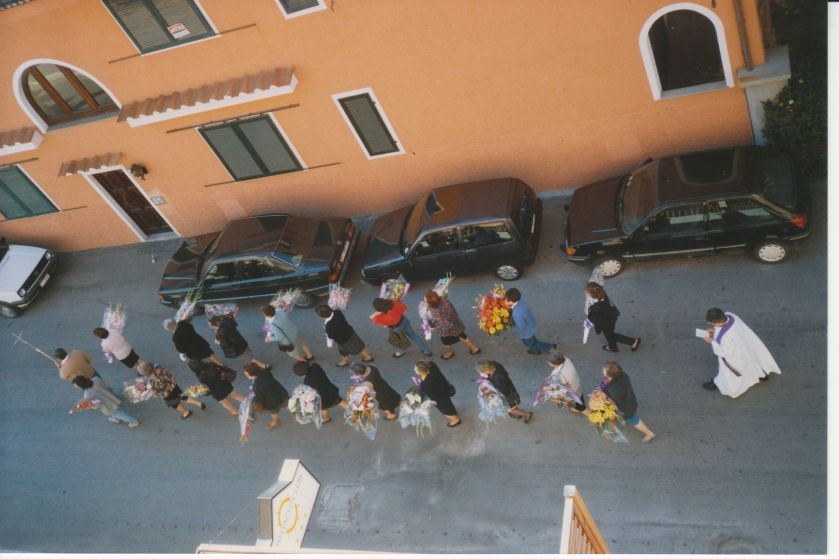A Day in the Life of: A Professional Mourner
By Elizabeth Prata
I created a series 5 years ago called “A Day in the Life of”. Here are the entries in that series:
A Day in the Life of: A Fisherman
A Day in the Life of: A Potter
A Day in the Life of: A Scribe
A Day in the Life of: A Shepherd
A Day in the Life of: A Tanner
A Day in the Life of: A Seller of Purple
A Day in the Life of: Introduction
Our teaching pastor went over a section in Matthew 9 on Sunday. The passage had a mention of mourners.
Professional mourner was a job in ancient Palestine. In our culture we are self-contained. We don’t sob at the Wake or the Memorial. We try to keep a stiff upper lip and contain the tears at funerals.
In ancient Palestine, it was considered acceptable, even required, to sob loudly, wail, and express one’s self with high emotion upon the occasion of a death. Professional mourners were brought in to help create an atmosphere of bereavement, and they didn’t hold back.
Mourning: The practice of grieving through crying and vocalization, most typically for the loss of someone.
Family members’ mourning typically involved sitting on the ground and trembling, tearing one’s clothes, putting ashes on one’s head, wearing sackcloth, or walking barefoot. Family members on a rotating basis would stay with the body so it was not left unaccompanied. Burial was rapid, as embalming was not a customary practice among Jews.
Until burial, though, during the grieving period, “To enhance the atmosphere of grief professional women mourners would be invited (Jer. 9:17).” Negev, A. (1990). In The Archaeological encyclopedia of the Holy Land.
Professional mourners were usually women, who tend to express emotions more easily and was more socially acceptable for that gender. Professional mourning was actually an acceptable job for a woman in ancient Israel. It was a good way to make money if a woman needed to. The more professional mourners there were the wealthier a family was seen to be. Hired mourners helped the family through their grief and offered comfort.
And when Jesus came into the official’s house, and saw the flute-players and the crowd in noisy disorder, (Matthew 9:23).
The word in the verse, ‘disorder’ is from the Greek thorubeó and it means “to make an uproar”.
Their job was to make a clamor. They wailed, lamented, chanted praises in death songs, played instruments. You can imagine the noise with all this lamentation, crying, flute-playing, plus the regular noise any crowd makes as people talk, cry, and move about.
“These mourners are neither somber nor reserved. “Commotion” is from the Greek root word thorubos which means noise, clamor, and public disorder. “Wailing” is from the Greek root word alalazo. It’s the “alala” sound soldiers made when rushing into battle, similar to what is referred to as ululation.” Source: BibleRef.com.
Jeremiah 9:17 mentions professional mourners, one of many places in the Bible that mentions this job: “Thus says Yahweh of hosts, “Carefully consider and call for the mourning women, that they may come; And send for the skillful women, that they may come!“
The amount of time spent mourning for the dead varied in the Bible from person to person. Jacob was mourned seventy days (Genesis 50:3); Aaron (Numbers 20:29) and Moses (Deuteronomy 34:8) were mourned thirty days; and for Saul only seven days (1 Samuel 31:13). In 2 Samuel 3:31-35, we have a description of the great mourning for the death of Abner. (Source Christians Answers).
Also Amos 5:16, Mark 5:38 mention professional women who mourn on behalf of a family. Professional mourning as a job was quite common, very normal. Here is a short Youtube clip of some professional mourners in Sardinia, filmed in 1963. This gives you an idea of the ‘clamor and disorder’ mentioned in the Matthew verse above:
Professional Mourners of Sardinia, from “Women of the World”. Filmed around 1963, from the Italian documentary “La Donna Nel Mundo” and is narrated in English by Peter Ustinov. Clip is 1:55. Sardinia is a large Island of Italy in the Mediterranean sea and north of Tunisia.
https://youtu.be/kJUQxelrZX4?si=8oULIyYVP4nASlA8
It also gives rise to a question in my mind. Death came frequently in ancient Israel. Sickness and tragedy were common. In the clip, it was stated that this group of professional mourners left their hired place of mourning at 4:00 am so as to attend another mourning job in a different village. What was it like to spend one’s days crying and lamenting? Was it hard to work up tears after a while? Or easier? Did their natural outlook become depressed and gloomy, since their entire professional career was to express sadness and grief? Did it take a toll on the emotions of the woman after a while?
In any case, the custom of professional mourning women was a thriving job for these women who chose it. It was a job for which there would always be a need.
I long for the day when death will be no more! No more wailing, crying, no more funerals, no more professional mourning industry! What a day that will be.

Fun fact: the name for professional mourners is moirologists





